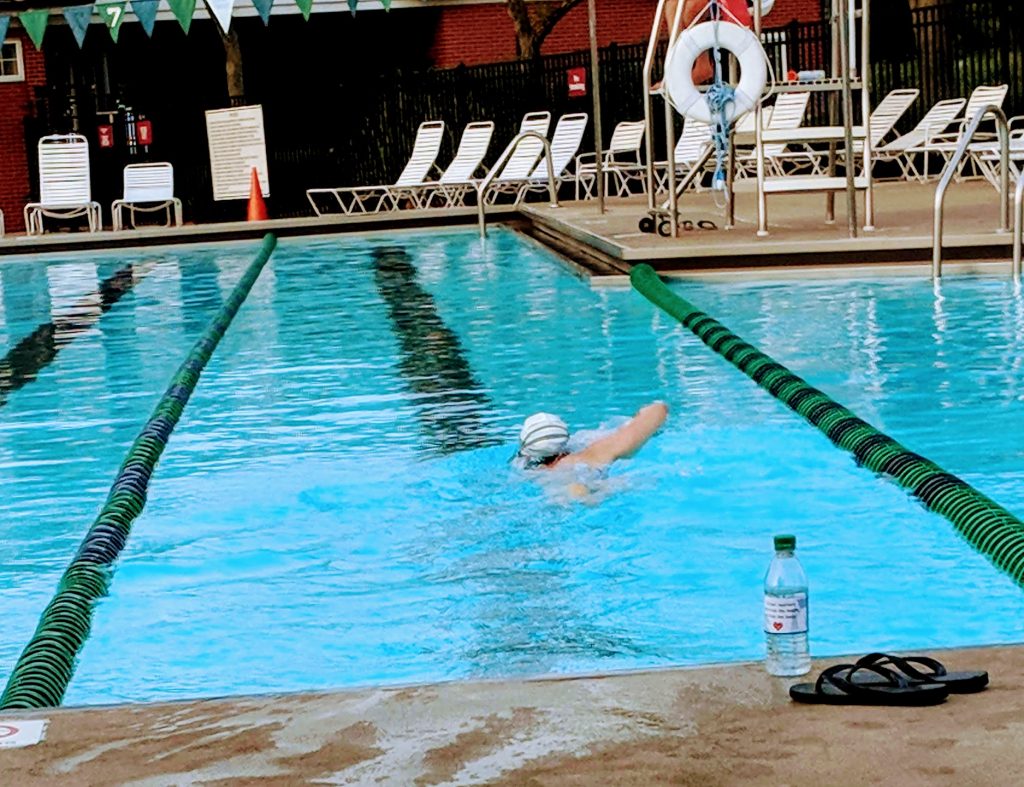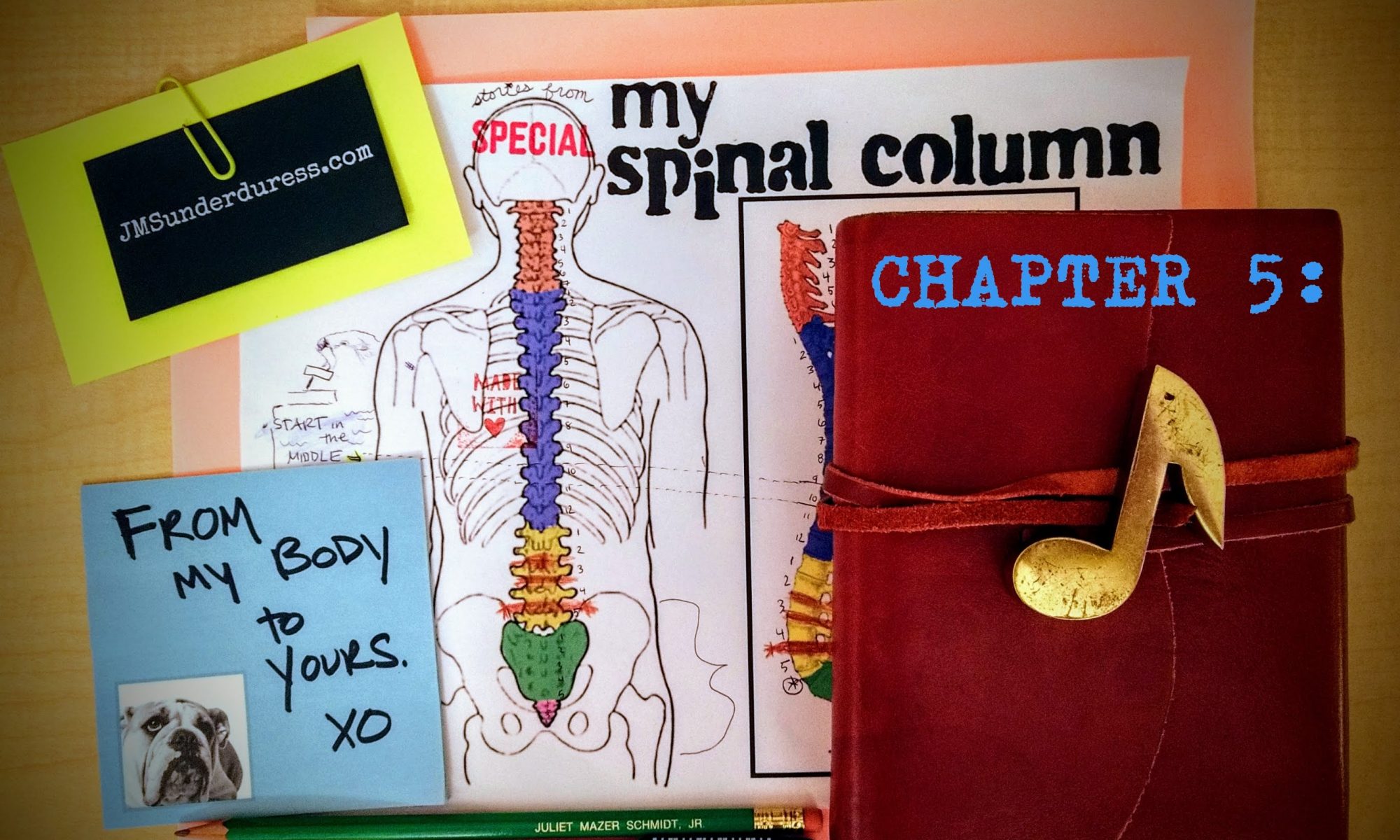MY SPINAL COLUMN is an ongoing series. To start at the very beginning (a very good place to start), click HERE.
Behind a piano, right thumb rooted on Middle C, three consecutive fingers can play Hammerstein’s “Do Re Mi.” (Here, C-D-E.) In The Sound of Music’s most teachable earworm, “Do” marks the tonic, the root – the “home” of the song: whatever chaos hands may conjure across the keys, the “Do” is what summons home.
The Key of “C” provides a nice, simple home base: straight path up (or down) the white keys makes a clean, major octave.
C: 1 – Do – Tonic. Root. Home. (Gretl’s cute and happy to be there)
D: 2 – Re – the Second (Marta wants a pink parasol)
E: 3 – Mi – the Third (Brigitta’s a narc with strong opinions about fashion)
F: 4 – Fa – the Fourth (Kurt’s encouragable)
G: 5 – So – the Fifth (Louisa’s a trickster)
A: 6 – La – the Sixth (Friedrich’s impossible)
B: 7 – Ti – the Seventh (Liesl doesn’t need a governess)
(C: 8 = Do! Octave complete – and, conveniently, out of von Trapp kids)
Sure, it’s all fun and games: singing about goatherds in pajamas during a thunderstorm – meanwhile, back behind the piano, what happens if Friedrich wants to start roll call? Everything else stays the same, but Maria starts the scale on La (A): La-Ti-Do-Re-Mi-Fa-So-La.
“Home” has moved six addresses north (or two south).
This is what music theory labels the “Relative Minor” (or, Minor 6th): the notes played in the octave haven’t changed, (it’s still a safe walk of consecutive white keys – or, singing von Trapps), but the energy of this new “home” shifts perspective.
A song’s point of view depends so much on where you start. La-Ti-Do-Re-Mi-Fa-So-La: starting with Friedrich leads to a sadder song.
But enough, for now, on lessons from Fräulein Maria – back to the music of swimming butterfly. (Trust me, it relates.)
Subscapularis; Infraspinatus; Teres Minor; Supraspinatus
A quartet of shoulder-bordering muscles combine to form each human arm’s “rotator cuff” – anatomical architects responsible for the “wingspan” (and career span) of an aquatic butterfly.
Through the lens of songwriting, I consider them a musculoskeletal 1-4-5-minor6 chord progression designed to rebrand an aging butterflier’s key signature from major to relative minor (sticking with the simplicity of “C,” that’s C, to F, to G, landing in A Minor): same pieces, reassembled ‘round a new root to evoke sad (Friedrich) undertones. It’s a change not necessarily perceived by a casually engaged ear, if distinct from the perspective of piano playing hands…or swimming shoulders.
Conservative calculations suggest my rotators logged more than 11,000 pool hours over the course of their competition career, before shifting into the asymmetrical adagio of a recreational freestyle.
As I play, I fixate further on the transition of a tonic chord itself from major to minor, (say, C to C Minor), which requires a trio of targeted frequency reductions spread across the eight-note octave: suddenly on that straight walk up the white keys, hurdles appear at E flat, A flat, and B flat – a trail of three half-steps down to melancholy.
I like to imagine that vibrations from my former races continue to ricochet off the walls of pools I’ve conquered, legacy preserved in the glory of their major key – I know this is not at all scientifically true, merely a starry-eyed solution for what happened to my flight frequency.
As with hands behind a piano, the stories behind where a body expends its energy – the “home” chosen, the patterns followed, are what foretell its diminish to Minor.
C / College
While merciless battles with ballet posture and body image undeniably factored into my decision to abandon studios for pools, the prospect of athletic scholarships – ridiculous for dance, but reasonable for swimming – carried significant sway in my pre-collegiate brain.
My high school’s swim team started morning practice sessions mid-August, hosted at one of the city’s outdoor pools – happily, the one closest to Grandma Mazer’s. Accordingly, my Freshman Year technically kicked-off via natation, adapting my mid-competition compositions in the company of some familiar faces – decade-long summer league rivals now-turned teammates.
By the time classes (and clothing selection beyond a bathing suit) entered the equation, I’d earned a spot at Varsity practice, new team parka, and a strong nickname (that would match the breed of my beloved future dog). Add to the trove: coveted locker space in Senior Hall – on account of my incredibly cool big brother’s incredibly cool offer to share his prime real estate. I left campus most lunchtimes (more senior big brother perks: car and senior lot parking space), rarely visiting the S-building halls that housed crowded rows of freshman lockers – too skinny to stash a Michigan-grade winter coat, let alone a swim bag. I entered high school with a reputation that showcased my body’s best-known accomplishments, guided by an older sibling who shared his status, skateboard ramps, and CD collection.
Four words to simultaneously uplift the downtrodden and caution the rich: this, too, shall pass.
When a torn ACL off a skateboarding injury and subsequent Friday the 13th surgery cast a shadow over my brother’s spring semester, I tracked his recovery with great interest: from incapacity, to crutches, to gradually-cut-down leg brace; his wobbly return to the quarter-pipe we’d built in Grandma Mazer’s driveway. Cheering him through each advancement back toward mobility, I couldn’t help but wonder how many more laps I had left in my own ligaments.
Recalling the internal data point of my Mortal Kombat quad pull, plus the publicized stories of famous swimmer shoulder woes (Olympian Amy Van Dyken’s surgeries overlapped with my own saga), I listened intently for the early signals – which found my frequency the following year.
When a post-workout ice pack, ibuprofen, and pre-bed stretching weren’t (nearly) enough to curb emergent shoulder aches, I met with my first physical therapist and learned all about rotator cuff tightness, tendonitis, and tears (oh my!). A few early mornings each week, while my teammates practiced pre-classes, I hand-biked at a rehab center under the supervision of a trained professional, light Muzak a lacking replacement for my underwater songwriting.
F / Folly
Thanks to financial aid, flexible parents, and generous friends with extra camping gear, I had spent part of my pre-Junior Year summer (post-swim season) on a life-altering adventure across southeast Alaska alongside eight similarly-aged strangers – each bringing their own cultural colloquialisms (and mix tapes) to the campfire. Suffice it to say, the experience left me hungry for another opportunity to explore more of the country under similar circumstances.
I signed-on for another trip the following summer, pre-Senior Year, this time through the Southwestern United States: kayaking, hiking, climbing and rafting from California to Utah – bookended by a full-time job lifeguarding job at yet another Grosse Pointe pool.
Scheduling curveball: I would miss summer league swim finals. Initially heartbroken, I had to acknowledge: the view from atop a Winners Podium was, by now, familiar territory (and no longer a lock) – I’d yet to lay my eyes on Yosemite. I loaded up a backpack and boarded a plane for San Francisco.
Week One involved whitewater kayaking in Mariposa County’s Yosemite Valley: a natural-born butterflier in butterfly terrain, I was eager to spend time in any body of water, foolishly fearless in the face of the rapids.
My memory of the incident itself remains hazy, I recall only a half-baked plan to swim.
The kayak in which I paddled flipped, imprisoning me underneath. A pair of weighty rocks trapped my shoulder and lifejacket, my head and torso trapped the boat; together, we formed an unyielding cautionary ornament of fiberglass and flesh, fated to disrupt local petrology. Water gushed in from upstream, quickly filling the airspace where I struggled to free my arm. I began to drown.
The crash of the current hit my submerged ears in full surround sound. No time to consider the future of my swimming career – I wouldn’t have one anyway if I didn’t survive the next sixty seconds. A file in my frantic, oxygen-deprived brain counseled me…to sing: the flow of a literal river as bassline, I assembled adrenaline-fueled super-strength to dislocate my own shoulder joint.
It wasn’t enough: escaping to the surface would require also removing my jammed lifejacket – a maneuver somehow more terrifying in the moment than separating my own bones. (We’d been cautioned about a thousand times NOT TO REMOVE THE LIFEJACKET, EVER – which struck me as excellent advice.) Cue the modified refrain: it won’t matter if you don’t survive the next sixty seconds.
I kicked my way from beneath the kayak, sans lifejacket, one shoulder outside its socket, gargling river water and desperate to breathe.
Upon reuniting with my group, I underplayed the severity of my “swim” downstream – but agreed readily to hiking out with one of our guides for a doctor visit. The bulk of an active itinerary remained – requiring me to carry all gear on my back, a thick strap over my damaged shoulder.
This was the moment I could (and did) consider the future of my butterfly: I accepted an untimely plane ticket home, hardly a week following my departure – but in time to swim summer finals.
Upon my early return to lifeguarding, a friend (also my boss at the time) handed me an addressed but unstamped envelope, my last name misspelled (to match aforementioned WWII fighter plane): inside, a letter (intended to find me mid-travel) stressed the importance of “home” – the place I’d returned too soon for its mailing.
G / Gurney
By the final summer of my swimming career, post-high school graduation, my rotators were well into their waning phase: I would not swim competitively in college, forced to find peace with the fact that, as an athlete, I had hit my peak quite young.
I agreed to take on coaching responsibilities at the pool where I lifeguarded. Handling the swimmers of one team while racing for another created ample material for playful banter at both parks, which I relished. After the practices I oversaw, I often hopped into a lane and completed my own workouts alongside my kids – who also enjoyed to taunt my “traitorous” ways.
During one such episode, a 14-year-old boy – aiming only for my attention – misjudged a dive off the starting block in the lane where I butterflied below, landing square on my spine.
Immediate system failure: I sank straight to pool bottom. …It took a few beats before anyone realized it wasn’t a “bit.”
Another water-damaged file, this one resumes with my motionless body strapped to a spinal board, confused colleagues in a surrounding semi-circle, joined shortly by paramedics; an ambulance ride, hours spent in hospital hallways while doctors ran tests. For a few harrowing hours, my family thought I might never walk again. (Desperate for comic relief, I distinctly recall my boyfriend – a fellow coach – picking my nose to test the alleged paralysis.)
Ultimately – and mercifully – ruled “spinal trauma,” feeling returned gradually to my extremities, working slowly inward: I was back in the water within days. My final race: 50 yards of painful butterfly my shoulders snap-crackle-popped their way through. I no longer recall what I placed.
That night, like most nights, I found solace in Grandma Mazer’s pool – this would mark its final season as well, and I savored every skinny-dip, cannonball, and ghost story left in my sweet, seventeen-summer reign.
A View from A Minor
Swimming butterfly remains the siren song to which my worn shoulders still surrender.
Underwater, my brain becomes entranced by echoes of a secret symphony my limbs can no longer play properly, sending sparse nostalgic notes across my nervous system – reminders of how wonderful it will feel to fly once more, however briefly. Melodic tinder sparks across my muscle tissue like a lit fuse heading straight for my hips, the furnace that fuels my recklessness, ever endeavoring to dance. I pull a few strokes as though sipping a glass of champagne, celebrating the slow jam my arthritic arms now conduct.
But for now, from the modest throne of a threadbare piano bench, I think of Grandma Mazer, place fingers on keys, channel the memories, and fly another way…
And it brings me back to…La.

IF YOU’D LIKE MORE OF THE STORY…please let me know. xo
More JMSunderduress you may enjoy…
THE GHIBLI GIRLS: A SERIES IN FIVE CHAPTERS
BETWEEN TWO BEAUTIFUL BOOKENDS (ESSAY)
INDOOR VOICES (singing!)

